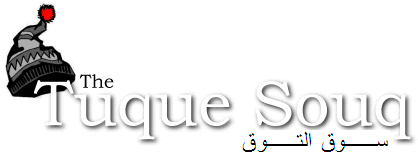 In a Middle East dispute that - for a change - has nothing to do with Hezbollah, the head of a consortium of Lebanese food companies is planning to file an international lawsuit against Israel for a violation of food copyright.
In a Middle East dispute that - for a change - has nothing to do with Hezbollah, the head of a consortium of Lebanese food companies is planning to file an international lawsuit against Israel for a violation of food copyright.The children of this gastronomical custody battle include such traditional Middle Eastern fare as Hummus, Falafel, Baba Ghanouj, Fattoush, Kibbeh and Tabbouleh. Fadi Aboud, president of the Lebanese Industrialists Association, claims that Israel is marketing the intellectual property of its neighbour as its own, costing the Lebanese millions of dollars in lost revenue and brand (mis-)identity.
"The Israelis are marketing such Lebanese delicacies under the same [Lebanese] names and ingredients around the world," Mr. Aboud said (quoted in Ha'aretz). "This is harming and causing great losses to Lebanon."
The lawsuit - which apparently is no joke - will seek to make these Middle Eastern dishes exclusively "Lebanese."
The great legal lynchpin in the case has to be the precedent of Feta, the Greek cheese which, after a successful 2002 lawsuit between Greece and Denmark, is now officially a Greek Cheese. It seems the Greeks were able to demand that the appellation "Feta" only apply to the stuff originating in Greece and from Greek sheep; all knockoffs must be called something like Farmer Murray's Salty White Crumbly Curds.
In the same way, those alimental autocrats in France have lobbied for exclusive rights to the term "champagne" (being a sparkling white from the Champagne region of France). Make a champagne in Napa and you have to use a euphemism.
Back to the mezze. Why should Lebanon get naming rights to what is eaten from Cairo to Baghdad, Istanbul to Tel Aviv to Sana'a (and around the world)? Much as Beirut is (or was once) the Paris of the Middle East, so Lebanon is the Champagne of Arab cuisine, with the best restaurants, the best chefs, and the best marketing. (The Tuque Souq has visited "Lebanese" restaurants in many cities, including Arab ones like Amman, Jerusalem and Ramallah.)
Yet much as they can claim to be the best at Middle Eastern fare, the Lebanese can hardly claim to be the originators. Falafel may have been invented in Egypt, and has already been the subject of dispute between Israel and Palestine. Syria could claim Tabbouleh. Hummus is at least 900 years old in the region (Lebanon is 150 years old), and the staple Chick Pea probably originated in eastern Turkey. (And Australia of all places is now the world's second-largest exporter of Garbanzos.) We've seen "Israeli couscous" marketed all over the place, but we know couscous came from North Africa.
Then again, the tomato's origin is nowhere near southern Italy, but we generally credit the Italians with perfecting its use in the pursuit of gustatory ecstasy. So why not give the Lebanese credit for all things chick pea?
Unfortunately, there's likely no pure justice in this dispute. The Tuque Souq believes that if you polled Middle Eastern countries on who should get culinary rights to hummus, the final tally would be:
Lebanon: 1 vote
Israel: 1 vote
Palestine: 1 vote
Syria: 1 vote
Egypt: 1 vote
Jordan: 1 vote
Hence, it seems (Hummus) War is the only option.

No comments:
Post a Comment